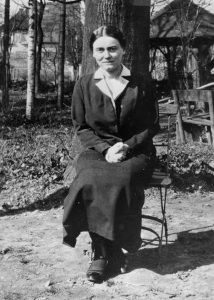Ord Om ordet
Edith Stein
The theologian Donald Nicholl tells the story of a trip he made through ravished Europe just after World War II, when he was in his twenties. Nicholl had early discovered the importance of Edith Stein. Wishing to see her monastery of profession and, if possible, to meet a few nuns who had known her, he went with a friend to visit the Carmel of Cologne. The two young men were privileged to meet the prioress, Mother Teresa Renata of the Holy Spirit. A firm friend to Edith, she became the saint’s first biographer.
Donald Nicholl spoke at length with that most venerable nun about high things. Only when the interview was coming to an end did his companion, more pragmatically minded, pipe up. His concern was an immediate one. Unused to monastic conventions, he said: ‘Oh Mother, just a small thing: there doesn’t seem to be an ashtray in my room.’ Nicholl wished the earth would swallow them up, thinking his credibility compromised. The prioress, though, did not bat an eyelid. She turned to the nun who accompanied her in the parlour, and exclaimed with mock horror: ‘Sister, honestly! What sort of Carmel is this! No ashtrays in the gentlemen’s bedchambers!’ Nicholl remarks retrospectively: ‘I could see that the spirit of the great Teresa was alive and well in Cologne.’
I love that story. It shows the forthrightness and warm, intelligent humanity of the environment that shaped Edith Stein’s Carmelite soul. She lived at immense depth. Her mind soared. At the same time she stayed rooted in concrete reality. This ability to embody, by grace, a heavenly ladder like the one Jacob saw, firmly grounded yet reaching into heaven, prepared her for the squalor of the circumstances in which she died and lets us recognise her there, in that overwhelming darkness, as a bright flame.
Mother Teresa Renata introduced her biography of Edith Stein, which Nicholl co-translated into English, saying that Edith ‘radiated the light of truth in an age that loved darkness more than light. Therefore her life had to be extinguished by violence’. I am struck by the force of that ‘therefore’. It recalls Christ’s warning, ‘I chose you out of the world, therefore the world hates you’ (Jn 15.19). To choose life in the midst of a culture of death, to opt for truth in a world that idolises falsehood is to set oneself up for attack; but it is to know, at the same time, that one is on the side of victory, ultimately speaking.
‘I have conquered the world’ (Jn 16.33) declares Jesus. He effected that victory not by savage, coercive means, but by free self-outpouring in love. You and I are drawn into that oblation, which will continue until the end of time, daily re-enacted, in sacramental form, on our altars. Its efficacy is undiminished.

Edith Stein shortly before she entered Carmel.
